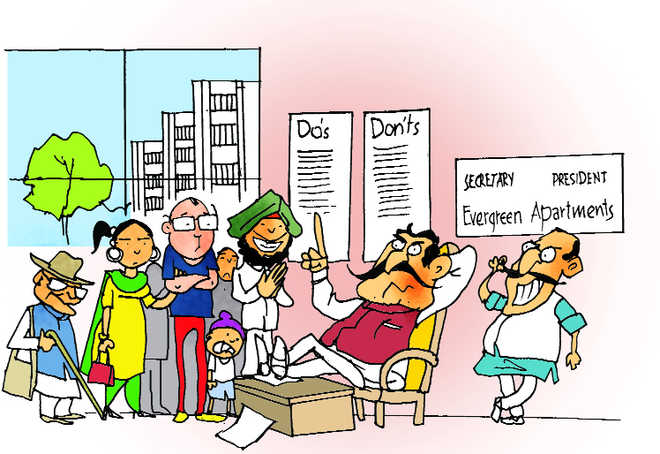RWAs can’t be urban khaps
Ravi Sinha
Some harsh realities of housing societies clearly indicate that there is little consideration given to the rights of privacy of singles and women. As a matter of fact, some of the residents ‘gang up’ and managing committees of RWAs can easily behave like urban khaps for those who don’t fall in line. Some examples:
- In Gurgaon the RWA (Residents’ Welfare Society) issued diktats to single tenants against entertaining guests of the opposite sex. When the move was objected to, the RWA labelled them as those supporting prostitution.
- In a housing society in Noida a female tenant was asked embarrassing personal questions about her male friend by the security guards. When she complained about it, the facility management office supported the guards’ intrusion.
It has been noticed that most RWAs issue moral and ethical diktats to the residents as a routine. The question is whether they have any legal standing to do so? More importantly, what are the immediate options left for homebuyers and/or tenants if the RWAs restrict their privacy, scrutinise their guests and question their lifestyle choices? Can a by-law framed by a housing society be in contravention with the law of the land?
Legal angle
The legal stand is pretty clear on the subject that any bylaw can’t ever be in contravention to the law of the land. It has to always be in sync with the spirit of ‘Right to Life’ guaranteed under Article 21 of the Constitution. Any resident who is aggrieved by the arbitrary and unreasonable actions of a RWA can file a suit under Section 6 of the Societies Registration Act, 1960. The RWA can be sued in the local civil court in the name of the President or Secretary.
For example, such law is substantively ultra vires Section 14 of the UP Apartment Ownership Act, 2010. The Bombay High Court in the case of Talmakiwadi Cooperative Housing Society case has held that (Citation:1999 (1) Bom CR 393) the bylaws of a society cannot violate the provisions of the Maharashtra Co-operative Societies Act, 1960. If they do so, they will be declared ultra vires and struck down.
Suvidutt Sundaram, Advocate-on-Record with Supreme Court, maintains that even though a resident has to make some compromises to live harmoniously in a group housing society, yet in no way can the RWA violate an individual’s rights. “Residents can approach a civil court with appropriate jurisdiction for compensatory relief against the RWA if their rights are being violated. That will, in a way, amount to waging a war against the RWA as a lone warrior,” says Suvidutt.
Advocate Aditya Pratap of Bombay High Court also asserts that an RWA has no legal authority to issue moral, ethical and social diktats to its residents. Any such measure is in direct violation of the fundamental rights prescribed in the Constitution. Further, if an RWA starts framing unreasonable conditions which restrict the sale or renting of flats, it will also directly violate an apartment owner’s right to property under Article 300A of the Constitution of India. “The RWA’s bylaws and resolutions must be limited to the mandate of governing the society affairs and nothing more. An RWA can’t transgress its statutory mandate under the Apartment Ownership Act of respective states. It has to act within its jurisdiction and can’t abuse its powers,” says Aditya.
Don’t take it lying down
Several states have clear clauses on this point. For example the Uttar Pradesh Apartment (Promotion of Construction, Ownership and Maintenance) Act, 2010, Section 14 states that the responsibility of a RWA is to look after the affairs in relation to apartments, common areas and facilities. Further Section 5(1)of the UP Apartment Ownership Act, 2010 states that an Apartment Owner shall have exclusive ownership and possession of his apartment. Therefore, the RWA can’t stop him from renting or selling his flat to any person, irrespective of religion, caste, race etc.
Even for the bachelor tenants no RWA or landlord can define who should be their guest, what they should wear, at what time they should come and leave the society, and what kind of food habits they can have.
However, in practice the RWAs often transgress their voluntary jurisdiction and start defining the rules of habitation. To make the matters worse, they have all the arm-twisting tactics in the book for those failing to comply with.
The legal options and help might be in favour of those who have suffered the dictatorial high handedness of the RWA, but it is often not that easy to challenge them in the court of law. The onus of proving the illegal dictat is on the victim. The neighbours might sympathise with the victim but no one normally comes forward to testify before the court of law and face the wrath of ‘organised’ coterie of RWA members.
— The writer is CEO, Track2Realty
Limits of ‘welfare’
RWAs are registered under the Societies Registration Act of 1960. The Apartment Ownership Act of various states also clearly defines that RWA has to handle everyday affairs like maintenance, facilities and general administration of the project premises. It cannot interfere with a resident’s right to use his flat. The RWA has to operate within the boundaries prescribed by the Act.









